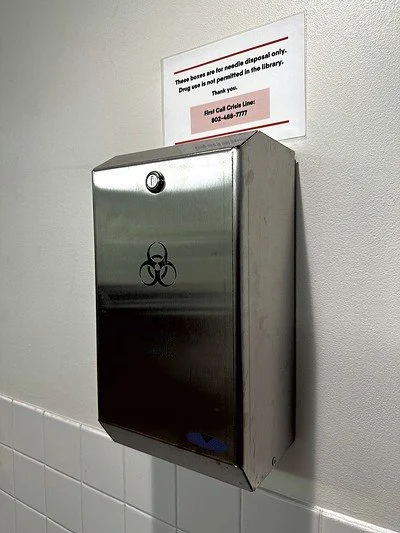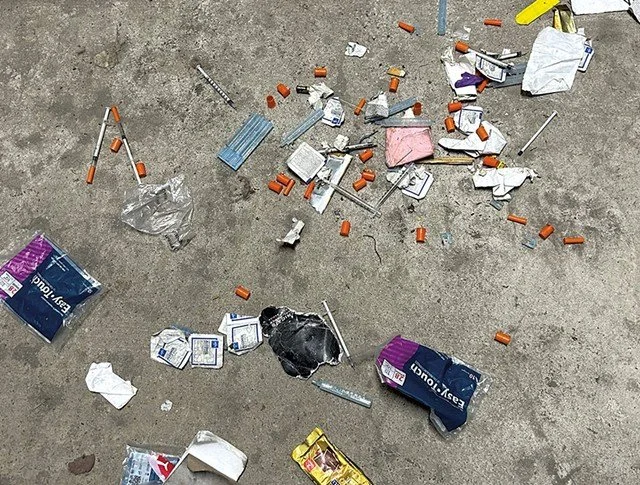Discarded Needles Litter Burlington. What Can Be Done?
Published by Seven Days on October 4, 2023
by Colin Flanders
Ted Miles begins most days behind Burlington's derelict Memorial Auditorium, wielding a steel trash grabber and a grimy plastic container that he fills with used syringes. He then heads north, toward the abandoned former YMCA building, where a fence was recently installed to keep homeless people out. On he goes, through back alleys and hidden stairways, picking up debris from the city's drug crisis.
Miles, a 59-year-old code enforcement inspector and deputy health officer, has become the go-to guy for discarded needles in the Queen City. The responsibility, which he assumed a few years ago mostly because someone had to, has taken on added importance this year because of a dramatic increase in syringe litter.
The city received more than 740 citizen complaints through the first nine months of 2023 about improperly discarded syringes, including some in parks and playgrounds. Many more used needles go unreported, left behind in the crevices of the urban underbelly that Miles navigates each morning. He said he picks up about 50 most days and estimated that he's collected three times as many this year compared to last — enough to fill a 55-gallon barrel.
"Our culture has trained us to think that injection drug use is really evil, dirty and depraved."
TOM DALTON
The sharp increase is a barometer of the city's worsening drug crisis. And while officials and treatment providers agree that the best solution remains getting people into treatment, they say they're also looking for ways to reduce the litter, such as a new incentive program that rewards people who return needles.
Discarded syringes have become not only a tangible hazard but also a symbol of declining public confidence. Residents routinely complain about them and post photos online. Advocates worry that frustration over the nuisance could increase harmful stigma and erode community support for progressive treatment initiatives.
"Our culture has trained us to think that injection drug use is really evil, dirty and depraved," said Tom Dalton, executive director of Vermonters for Criminal Justice Reform, a nonprofit service organization with many clients who use drugs. "Solutions get dark when you don't address things in a proactive way."
The vast majority of needles in Burlington originate from the Howard Center's Safe Recovery, which distributes more than half a million syringes annually through an exchange program run out of its Clarke Street offices.
Syringe exchanges are proven to reduce the spread of transmissible diseases such as HIV and hepatitis by providing people with clean needles. The programs represent the bedrock of the strategy known as harm reduction that seeks to help people consume drugs more safely.
Used needles are considered health hazards. And though research suggests that the risk of catching a transmissible disease from one is quite low, people accidentally stuck by a discarded syringe often must undergo several rounds of testing.
Burlington officials describe their needle disposal program as one of the most robust in the U.S., with at least a dozen sharps deposit boxes in public areas, including at city hall, Oakledge Park, North Beach, Fletcher Free Library, the Robert Miller Community and Recreation Center, and the waterfront. Outdoor medical waste containers have also been added to City Hall Park and Battery Park, while city staff are now handing out portable disposal boxes to unhoused people.
Dalton, who led Safe Recovery for nearly 20 years before leaving in 2017, launched a pickup program while there partly out of public health concerns. It also allowed the agency to keep closer tabs on the prevalence of use in the community, he said. But the organization ended the effort a few years ago to focus on the growing demand for its case management services.
The city has filled the void. Municipal employees, from park rangers to parking garage attendants, now pick up needles as a regular part of their job.
In addition to his morning sweeps, Miles handles all resident complaints about syringes reported through the city-run app SeeClickFix. Data from the app show the number of complaints hovered around 40 per year between 2012 and 2020, then spiked to 300 in 2021.
"This isn't a political issue. This is a people issue. This is something we all need to work on."
TED MILES
Last year, Miles reported each batch he personally discovered in an attempt to keep more accurate data. He stopped after some residents complained that he was "cooking the books." Citizen reports from 2023 are nevertheless on pace to surpass 900 this year.
Sometimes residents provide photos and precise locations of the needles they report on the app. Other complaints include only a street name. "It's literally searching for a needle in a haystack sometimes," Miles said.
Burlington officials have urged Safe Recovery to recover more of the syringes it hands out. Similar pleas in other cities grappling with syringe litter have led some programs to enact new restrictions, such as requiring people to return a used needle in order to receive a clean one.
Safe Recovery has no plans to go that route, said Dan Hall, director of the Howard Center's outpatient services. Research shows that the harder it is for drug users to access exchange programs, the likelier they are to reuse needles and the likelier they are to catch and spread diseases. The Howard Center has recently interviewed people who left out-of-state exchange programs over frustration with new restrictions, Hall said.
The Burlington agency, whose clients typically request between 50 and 200 syringes at a time, has instead started offering incentives: People who return at least one syringe can draw a slip of paper out of a fishbowl and earn a reward, ranging from a free snack or a coffee to a recent top prize of an iPhone.
The program has been popular since it launched last month, Hall said. Half of the 32,000 needles distributed during the first two weeks of the program were returned, a sizable increase over the typical ratio. Similar rewards-based programs are being piloted in Boston and New York City.
Safe Recovery staff also try to remind clients that syringe litter upsets passersby and can harm the exchange's reputation. That message often hits home, Hall said, as many people find Safe Recovery to be their "haven."
"We all know the value of the exchange. We don't want anything to jeopardize it," he said.
It becomes harder to appeal to someone's shared sense of community, however, when they can log online and find social media accounts blasting out photos of drug users shooting up in Burlington, advocates said.
"They're not doing that from any positive motivation," Dalton said. "It's voyeuristic and mean spirited."
Miles, who plans to retire next year, said he must sometimes shut off the emotional part of his brain to cope with the scenes of despair he comes across on his daily sweeps. But he also tries to remember that behind each discarded needle is a person in need. It's a mental exercise made easier by the fact that he himself was once homeless, struggling with alcoholism. Every October, he said, he buys 100 pairs of socks and distributes them to people in need around town.
Over the weekend, Miles said, he received a survey from the Burlington GOP focused on the perception of public safety in the city under Mayor Miro Weinberger, who announced last week that he won't seek reelection. The tone worried Miles. "This isn't a political issue," he said of the drug crisis. "This is a people issue. This is something we all need to work on."
"And believe me," he said, "if you've got a solution, please tell us. Because we'd all like to hear it."




